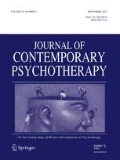Abstract
The issue of force and energy in behavioral change involves the following question. Assuming that certain ideas or cognitions help individuals to change their basic personality structure, is it important that these ideas be conveyed by the therapists, or by the clients, to themselves, in a vigorous, forceful and dramatic manner? This question, along with the concomitant one of “intellectual” versus “emotional” insight, has been neglected and avoided in much of the recent literature. This article considers these questions, tries to formulate an operational definition of force and energy in behavioral change, and suggests some specific things that clients may do to achieve “emotional” insight or elegant philosophic reconstruction.
Similar content being viewed by others
References
Adler, A.Understanding human nature. New York: Greenberg, 1927. (Greenwich, Conn.: Fawcett World, 1968)
Albin, R., & Montagna, D.D. Mystical aspects of science.Humanist 1977,37(2), 44–46.
Alexander, F., & French, T.M.Psychoanalytic therapy. New York: Ronald, 1946
Alperson, B.L. On shibboleths, incantations, and the confusion of the I-thou and the oh-wow.Humanist 1976,36(1), 12–14.
Beck, A.T.Cognitive therapy and the emotional disorders.) New York:Grune and Stratton, 1976
Benson, H. The relaxation response New York: Avon, 1975.
Burton, A.Encounter. San Francisco: Jossey Bass, 1969.
Campbell, J. Seven levels of consciousness.Psychology Today 1975,9(4), 77–78.
Casriel, D.A scream away from happiness. New York: Grosset & Dunlap, 1974.
Duffy, A. Esalen: Slow death.Villagz Voice, June 2, 1975, pp. 8–9.
Ellis, A.How to live with a “neurotic.” New York: Crown Publishers, 1957. (Rev. ed., New York: Crown Publishers, 1975.)
Ellis, A.Reason and emotion in psychotherapy. New York: Lyle Stuart, 1962.
Ellis, A. Toward a more precise definition of “emotional” and “intellectual” insight.Psychological Reports 1963,13, 125–126.
Ellis, A.Growth through reason. Palo Alto, Calif.: Science and Behavior Books and Hollywood Calif.: Wilshire Books, 1971.
Ellis, A. What does transpersonal psychology have to offer to the art and science of psychotherapy.Voices 1972,8(3), 10–20. ed version:Rational Living, 1973,8(1), 20–28
Ellis, A.Humanistic psychotherapy: The rational-emotive approach. New York: Julian Press and McGraw-Hill Paperbacks, 1973.
Ellis, A. The biological basis of human irrationality.Journal of Individual Psychology 1976,32, 145–168. (a)
Ellis, A.Sex and the liberated man. New York: Lyle Stuart, 1976. (b)
Ellis, A.How to live with—and without—anger. New York: Reader's Digest Press, 1977 (a)
Ellis, A. Religious belief in the United States today.Humanist 1977,37(2), 38–41. (b)
Ellis, A. Why “scientific, professionals believe mystical nonsense.Psychiatric Opinion 1977,14(2), 27–30. (c)
Ellis, A. Rational-emotive therapy. In R.J. Corsini (Ed.),Current psychotherapies. (Rev. ed.) Itasca, Ill.: Peacock, 1978.
Ellis, A., & Grieger, R.Rational-emotive therapy: A handbook of theory and practice. New York: Springer, 1977.
Ellis, A., & Harper, R.A.A new guide to rational living. Englewood Cliffs, N.J.: Prentice-Hall and Hollywood, Calif.: Wilshire Books, 1975.
Finney, B.C. Say it again: An active therapy technique.Psychotherapy 1972,9, 128–131.
Flew, A. Parapsychology revisited: Laws, miracles, and repeatability.Humanist 1976,36(3), 28–30.
Freud, S.Standard edition of the complete psychological works of Sigmund Freud. London: Hogarth, 1965.
Goldfried, M.R., & Davison, G.C.Clinical behavior therapy. New York: Holt, Rinehart and Winston, 1976.
Harrel, D.E., Jr.All things are possible. Bloomington, Ind.: Indiana University Press, 1976.
Hobbs, N. Sources of gain in psychotherapy.American Psychologist 1962,17, 741–747.
Hovland, C.I., & Janis, I.L.Personality and persuasibility. New Haven, Conn.: Yale University Press, 1959.
Ingalls, J.D.Human energy: The critical factor for individuals and organizations. Reading, Mass.: Addison-Wesley, 1976.
Jacobsen, E.You must relax. New York: McGraw-Hill, 1942.
Janov, A.The primal scream. New York: Dell, 1970.
Krippner, S., Davidson, R., & Peterson, N. Psi phenomena in Moscow.Journal of Contemporary Psychotherapy 1973,6, 79–88.
Kurtz, P. Gullibility and nincompoopery.Religious Humanism, Spring 1976, pp. 1–7.
Lazarus, A.A.Learning to relax. (Tape recording.) New York: Institute for Rational Living, 1976.
Lazarus, A.A.In the mind's eye. New York: Rawson, 1978.
Lembo, J.The counseling process: A rational behavioral approach. New York: Libra, 1976.
Lowen, A.Pleasure. New York: Lancer, 1970.
Mahoney, M.Cognition and behavior modification. Cambridge, Mass: Ballinger, 1974.
Maslow, A.Toward a psychology of being. Princeton, N.J.: Van Nostrand, 1962.
Masters, W., & Johnson, V.A.Human sexual inadequacy. Boston: Little, Brown, 1970.
Maultsby, M.C., Jr.,Help yourself to happiness. New York: Institute for Rational Living, 1975.
Maultsby, M.C.., Jr., & Ellis, A.Technique for using rational emotive imagery. New York: Institute for Rational Living, 1974.
Meichenbaum, D.Cognitive-behavior therapy. New York: Plenum, 1977.
Osgood, C.E. Exploration in semantic space.Journal of Social Issues 1971,24, 5–6.
Ostrander, S., & Schroeder, L.Psychic discoveries behind the Iron Curtain. New York: Bantam, 1974.
Perls, F.Gestalt therapy verbatim. Lafayette, Calif.: Real People Press, 1969.
Pulvino, C.J. Psychic energy: The counselor's undervalued resource.Personnel and Guidance Journal 1975,54,(1), 28–32.
Rogers, C.R.On becoming a person. Boston: Houghton Mifflin, 1961.
Schutz, W.C.Here comes everybody. New York: Harper & Row, 1971.
Shapiro, D.H., & Zifferblatt, S.M. Zen meditation and behavioral self-control: Similarities, differences, and clinical applications.American Psychologist 1976,31 519–532.
Smith, R.F.Prelude to science. New York: Scribner's, 1976.
Sperry, R.W. Bridging science and values: A unifying view of mind and brain.American Psychologist 1977,32, 237–245.
Targ, R., & Puthoff, R.Mind-reach. New York: Delacorte Press, 1977.
Weil, A.The natural mind. Boston: Houghton Mifflin, 1973.
Wolberg, L.R.The technique of psychotherapy. New York: Grune and Stratton, 1967.
Author information
Authors and Affiliations
Rights and permissions
About this article
Cite this article
Ellis, A. The issue of force and energy in behavioral change. J Contemp Psychother 10, 83–97 (1979). https://doi.org/10.1007/BF01667409
Issue Date:
DOI: https://doi.org/10.1007/BF01667409




